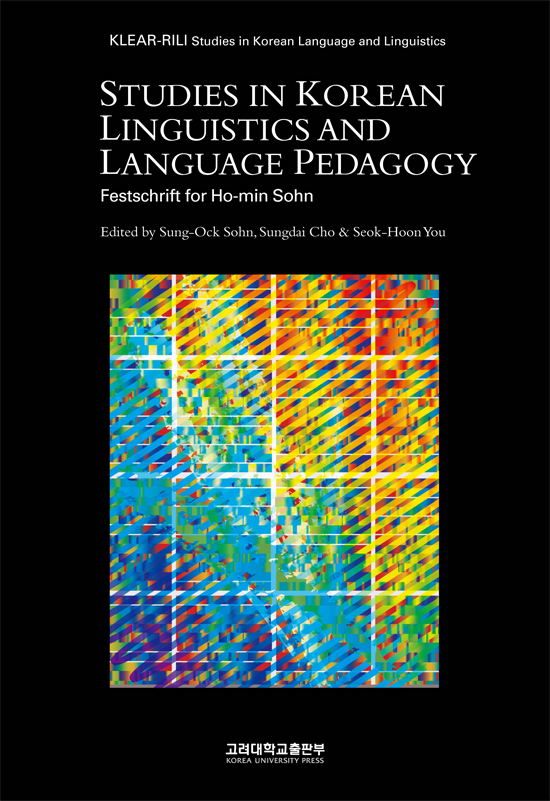Preface
Contributors
Introduction
PART I KOREAN LINGUISTICS
1. Korean Honorific Sentence Ending, -pnita:
Indexing of Knowledgeable Expert • Sumi Chang
2. Semantic and Pragmatic Functions of Sentence Enders
-kwun and -ney in Korean • In Jung Cho and Young-A Cho
3. KULENIKKA as a Marker of Agreement and Disagreement • Jae-Eun Im
4. The Classification of Compounds Revisited:
with Reference to Korean and English • Weon-Don Jeong
5. Opacity: Back to Derivation? • Gyung-Ran Kim
6. Common Grammatical Properties of World Englishes • Jeong-Ryeol Kim
7. Double Evidential Marking in Korean Storytelling • Mary Shin Kim
8. The Price of Politeness: Subject Honorification and Processing
• William O’Grady, On-Soon Lee, and Miho Choo
9. The Grammaticalisation of -(u)l ke(s) in Korean • Duk-Soo Park
10. Etymologies and Uncooperative Facts • S. Robert Ramsey
11. Dialogic Contexts for the Emergence of New Grammar:
The Case of Final -ketun in Korean • Sung-Ock Sohn
12. The Mongolian Names for ‘Korea’ and ‘Korean’ and Their
Significance for the History of the Korean Language • Alexander Vovin
13. Interactive Nature of the Korean Honorific Marker -yo • Sang-Seok Yoon
PART II KOREAN LANGUAGE PEDAGOGY
14. Vocabulary Teaching and Learning in KFL Classroom Settings:
What To Know and How To Teach • Andrew Sangpil Byon
15. Collaborative Writing with Concept Maps • Sungdai Cho and Yongjin Lee
16. The Effect of Short Term Study Abroad Program on Proficiency Gains • Sahie Kang
17. Globalization and Process of Transformation of Language of Korean Students in America • Hi-Sun H. Kim
18. Quest for Identity: Korea’s Language and Culture on the World Stage • Young-Key Kim-Renaud
19. Exploration of Applicability of Pilot 6.0 and Paradox 9.0 in KSL Research • Eun-Joo Lee
20. Collocation Usage by Learners of Korean:
Analysis and Pedagogical Implications • Sang-suk Oh and Mi-Hyun Kim
21. An Effective Way of Teaching Korean Obstruents to Beginning Learners • Mee-Jeong Park
22. Cognitive Linguistics and Second Language Instruction
for Teaching Korean Postpositons -ey and -eyse • Ebru Türker
23. Trends and Issues in Korean Language and Culture Education
Research: A Comparative Study • Hye-Sook Wang
PART III KOREAN LANGUAGE PEDAGOGY AND GENERAL(WRITTEN IN KOREAN)
24. 온라인 영어독해 수업에서의 상호작용 활성화 방안에 대한 연구
(The Acquisition of Korean Head-internal Relative Clauses by Korean Adults) • 조수근 (Sookeun Cho)
25. 대화분석과 한국어의 대화분석적 연구
(Conversation Analysis and Conversation-Analytic Studies in Korean) • 김해연 (Haeyeon Kim)
26. 손호민의 The Korean Language (1999)에 대한 소견
(A Review of The Korean Language) • 고영근 (Yong-Kun Ko)
27. 한국어 상세화 연구와 교재 개발의 실제
(Research on Korean Text Elaboration and its Practice on Materials Development)
• 공동관 (Dong-Kwan Kong)
28. 북한의 우리말 연구사 (A Development of Korean Linguistic in North Korea) • 권재일 (Jae-il Kwon)
29. 경동사 구문 ━ 한국어와 영어의 ‘-하다’/do의 논항 구조와 관련하여
(Light Verb ‘-hata’/do Constructions: In Relation to Argument Structure in Korean and English) • 이정민 (Chungmin Lee)
30. Standards for Korean Language Learning의 Indicator 수정을 위한 제안
━ Goal 4: Comparison, Standard 4.1을 중심으로
(Suggestions for the Revision of Indicators for Standards for Korean Language Learning) • 이지선 (Jeyseon Lee)
31. 한국어 교사 문법과 학습자 문법의 범주(範疇)에 대하여
(Categories of Teacher’s and Learner’s Grammar in Korean Language Pedagogy) • 백봉자 (Pong-Ja Paik)
32. 한국어 교육문법의 체계와 내용
━ Korean: A Comprehensive Grammar (Yeon and Brown)를 중심으로
(Organization and Contents for Korean Pedagogical Grammar) • 연재훈 (Jaehoon Yeon)
33. 토론수업 활성화를 위한 팀 프로토콜 방법 활용 연구
(Team Protocol Method as an Effective Way of Enhancing Students’ Participation
in the Discussion Session) • 유석훈 (Seok-Hoon You) Major Publications
저자 : Sung-Ock Sohn 외
Andrew Sangpil Byon – State University of New York at Albany Sumi Chang – University of Hawai멼 at M?oa In Jung Cho – Monash University Sookeun Cho – The Cyber University of Korea Sungdai Cho -State University of New York at Binghamton Young-A Cho – Monash University Miho Choo – University of Hawai멼 at M?oamore





